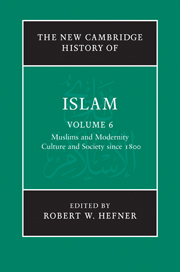1 - Introduction: Muslims and modernity: culture and society in an age of contest and plurality
Published online by Cambridge University Press: 28 March 2011
Summary
On the eve of the modern era, Islam, not Christianity, was the most globalised of the world’s religions. Muslim-majority societies stretched across a broad swath of Old World territory from West Africa and Morocco in the west to China and the Malay archipelago in the east. Several pieces were to be added to the map of the Muslim world after the eighteenth century, but otherwise most of what was to become the Muslim world’s modern expanse was in place. Meanwhile, however, another international order was emerging, one driven not by the hallowed imperatives of a world-transforming religion but by the demands of industrial revolution and imperial expansion. The West’s great transformations were to unleash their own globalisations, ones that were to challenge Muslim culture and society to their core.
Earlier, in the late medieval period, the Muslim world had shared with China the distinction of being the greatest military and economic power on earth. Whereas Chinese emperors dominated only the far eastern face of the Eurasian land mass, however, Muslim rulers presided over its vast central and western domains. Muslim merchants also held monopoly shares in the maritime trade that stretched from Indonesia’s spice islands through India and southern Arabia to the Mediterranean. Though jealously eying its riches, Western Europeans were but bit players in this vast mercantile ecumene. In matters of scholarship, too, medieval Muslims had inherited and expanded on the civilisational accomplishments of ancient Greece, Persia and India.
- Type
- Chapter
- Information
- The New Cambridge History of Islam , pp. 1 - 36Publisher: Cambridge University PressPrint publication year: 2010



